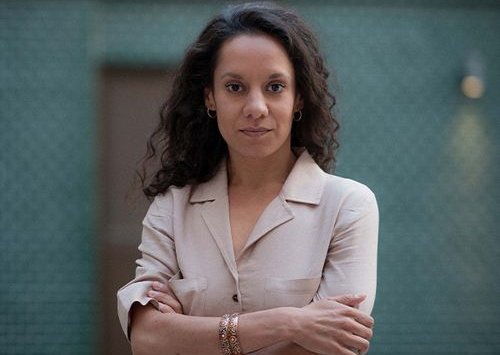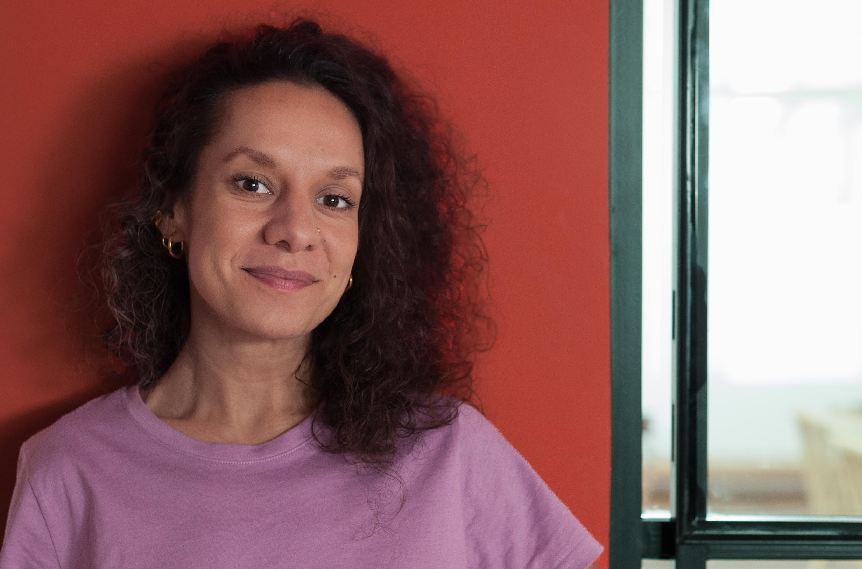
(hier klicken für deutsche Version)
„I will not let anyone tell me who I am“ – Julia Wadhawan (*1987) is a German-Indian journalist based in Hamburg. In her book, she uses personal experiences to question societal ascriptions of identity and belonging. She calls for more discipline and self-reflection in dealing with diversity and advocates for attitude instead of polarization. As an author at DER SPIEGEL and a seminar leader for perspective awareness, she promotes a more open and honest debate culture and regards the German-Indian community as enriching diversity, as she explains to us in this conversation.
“I wanted to write a book about India – and realized I was writing about myself”. That is how you describe the starting point of your book. When did it become clear to you that it was actually about your own perspective – and what changed for you as a result?
That realization grew in me for about a year. The initial idea was to tell the story of India from the perspective of people living there – rather than, as is often the case in journalism, from the perspective of outsiders. That always creates a distortion, because we mostly tell what we perceive as different, new, or striking. In doing so, we end up telling more about ourselves than about the other. But the longer I thought about it, the clearer it became that my own perspective carried a different kind of strength, because I had always moved between these two sides: somehow part of it and somehow an outsider.
For me, that felt liberating and so much more honest. Where I had long been stuck, the words suddenly started to flow. Because I no longer had to choose one perspective over the other, but was allowed to bring them together – even within myself.
In your book you say something along the lines of: “Anyone who speaks about India has to justify themselves for India. Anyone who writes about Germany does not.” I find that interesting – what does this double standard reveal about our understanding of belonging? And how do you experience such boundaries yourself, in everyday life or in your work?
There is a key scene in the book where my father and I argue about who is able and allowed to interpret India. In this dialogue, he suddenly addresses me as a German journalist who does not live in India but constantly writes about it. Until then, I had always been his daughter, the one who knew India better than others. The whole book moves between these poles: Whose perspective is most often heard and recognized as truth? Who has the power to be heard – and who does not? How does that shape what we consider to be true?
We can apply these questions to many other issues: Who can and may speak about racism? About sexism? About security and freedom?
We are constantly getting it wrong. Some argue: if you speak from personal experience or personal involvement, you are biased or, even worse, emotional. What is considered rational and true is what is told with distance. Others believe: only those who have experienced something themselves can speak about it truthfully. I am convinced that we need personal experience in order to truly understand universal matters.
In the context of identity and belonging, I think we underestimate two things: First, the physicality of belonging. We know today, for example, that trauma can be passed on through generations. There is a form of connection to certain people that is literally in our bones. Second, the insignificance of that same thing. We feel a sense of belonging where we feel seen, heard, and supported – where we share experiences or have a common purpose. Identity in this sense is fluid – it is always a negotiation of roles in a given moment. A dialogue.
“I will not let anyone tell me who I am” – this sentence runs like a thread through your writing. What experiences or encounters have strengthened you in adopting this stance?
Many encounters with other people, in India as well as in Germany, but also many encounters with myself. I share some of them in my book. The central point is this: we all carry assumptions within us – about ourselves and about others. These assumptions are shaped by society and culture. By believing them, we act accordingly. This keeps us and others trapped. Because we put people into categories, judge them, and then are surprised when they behave differently than we thought.
Classic examples are phrases such as: “He speaks very good German,” “As an Indian woman, you must be able to eat spicy food,” or “Wow, that man takes care of the child”.
Skin color, religion, origin – in Germany (and elsewhere) these are often categories imposed from outside. What would need to change in society or in the media so that people are perceived less through such labels and more through their perspectives? And perhaps in this context: what do you make of ‘false Indian, false German’?
I believe we need more discipline. My sense is that as a society we are often lazy or careless in our thinking and speaking. As a result, we keep certain perception filters alive. Basically, we would need to stop telling stories based on these categories. I notice this in everyday life when someone says: “There was this Black woman…” Why is it important that she was Black? Why not just say: “There was a woman…”? We would need to be much more mindful in overcoming what our brains do – namely highlighting what they do not recognize. Instead, we should focus more on what connects us.
This is both a personal and a collective process. At present, I think we as a society are in the process of taking ourselves apart. All these terms, abbreviations, and labels are nothing but attempts to perceive ourselves in all our diversity. Every piece needs attention and needs to be understood – especially by those for whom these experiences are unfamiliar. But the deeper we go into individual pieces, the more fragmented they become. Every community, every person is infinitely diverse within themselves. At some point, we will inevitably reach the stage where we recognize the commonalities.
In journalism, we need more self-awareness for this. But aspiring journalists are still being told the myth of objectivity. They keep themselves out of the stories – when in fact, as human beings, we always tell from our own perspective. It would be more honest and constructive to pay attention to that. That would allow us to create real, healthy distance in the first place. I also give seminars on this topic: The Power of One’s Own Perspective.
When I read your articles, you argue for attitude instead of polarization – and that is a strong statement in today’s often heated debate culture. How do you manage to maintain a clear stance without falling into rigid camp thinking? And what do you wish for public discourse?
I do not always succeed. I am human too. I practice constantly looking for connection and saying “I do not know” more often. That is in my nature, but it is also something you can train. I make a conscious effort to bring up uncomfortable topics – in personal relationships, but also beyond. That means I have to be able to endure and live with my own fear. Yoga and writing help me with that. I regularly confront myself. And I also practice leniency with myself. Ultimately, it is an exercise in flexibility: in every situation, understanding what matters most in order to enable connection.
In your journalistic work, you address social issues, but also digitalization and development cooperation – and most recently also yoga. What are the current topics you are working on – and what do you want to focus on more in the future?
I am currently writing about yoga for DER SPIEGEL in a dedicated series as well as in my newsletter. For me, it encompasses many aspects that are socially important: psychology, health, philosophy, and humanity. In addition, I have recently started leading the project WHO CARED: we are building an online archive that collects the life stories of people who left their homeland to work in caregiving. As a first step, we are focusing on women from southern India’s Kerala region who came to Germany as nurses in the 1960s and 1980s. We want to encourage the second generation to interview their mothers, record these conversations on video, and in this way honor their life stories – which are, after all, also part of German history.
theinder.net was founded to make the voices of the German-Indian community more visible. How do you view this community yourself – and what does a German-Indian identity mean to you today, and how do you perceive it in others?
I did not grow up in the context of such a community and have only recently – essentially since my book – started to move within it. So I do not have extensive experience. But I experience it as a great enrichment to meet people who embody similar contradictions within themselves. That is a new level of belonging I did not know before. Not even in relation to others with migration backgrounds.
Thank you very much for sharing your perspective!
Additional links:
Book: „Sag mir nicht, wer ich bin“ by Julia Wadhawan, dtv Verlag (2022), 240 pages, ISBN 978-3423263252
Abstract: An end to polarization! Julia Wadhawan’s father is from India – but he does not want to be Indian. At home he speaks German, loves Schnitzel, and makes it clear to his daughter: We are a perfectly normal German family. But not everyone sees it that way. Caught between the labels imposed by others, Julia develops an aversion to any form of group identity – until, as a journalist, she travels to India and the country forces her to take a stance. Along the lines of skin color, religion, and origin, the author reveals global structures that shape our self-image and perception of others far more than nationalities do. “Do not tell me who I am” is her personal and passionate plea for embracing diversity while standing firm in one’s convictions.

